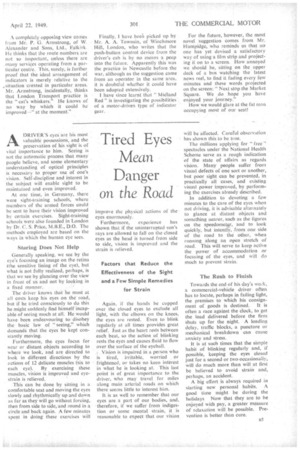Tired Eyes Mean Danger
Page 13

If you've noticed an error in this article please click here to report it so we can fix it.
on the Road
improve the physical actions of the eyes enormously.
Furthermore, experience has shown that if the uninterrupted son's rays are allowed to fall on the closed eyes as the head is turned from side to side, vision is improved and the strain is relieved.
Factors that Reduce the Effectiveness of the Sight and a Few Simple Remedies for Strain ADRIVER'S eyes are his most valuable possession, and the preservation of his sight is of vital importance to him. Seeing is not the automatic process' that many people believe, and some elementary understanding of optical principles is necessary to proper• use of one's, vision. Self-discipline and interest in• the subject will enable sight to be maintained and even improved.
At one time, in Germany, there were sight-training schools, where members , of the armed forces could be sent to have their vision improved by certain exercises. Sight-training schools were also founded in London by Dr. C. S. Price, M.B.E., a.0. The methods employed are based on the ways in which the human eye 'sees.
Staring Does Not Help
Generally speaking, we see by the eye's focusing an image on the retina (the sensitive lining of the eye), but what is not fully realized, perhaps, is that we see by glancing over the view in front of us and not by looking in a fixed manner. , .."
The driver knows that he must at all costs keep his eyes on the road, but if he tried consciously to do this he might suddenly find himself incapable of seeing much 'at a.11: He would have been endeavouring to disobey the basic law of "seeing,' which demands that the eyes be kept constantly moving.
Furthermore, the eyes focus for near or distant objects according to where we look, and are directed to look in different directions by the actions of 12 delicate muscles (six to each eye). By exercising these muscles, vision is improved and eyestrain is relieved.
This can be done by sitting in a comfortable seat and moving the eyes slowly and rhythmically up and down as far as they will go without forcing, then from side to side, and round in a circle and back again. A few minutes spent in doing these exercises Will Again, if the hands be cupped over the closed eyes to exclude all light, with the elbows on the knees, the eyes are rested. Even to blink regularly at all times provides great relief. Just as the heart rests between each beat, so the action of blinking rests the eyes and causes fluid to flow over the surface of the eyeball.
Vision is impaired in a person who is tired, irritable, worried or frightened, or takes no keen interest in what he is looking at. This last point is of great importance to the driver, who may travel for miles along main arterial roads on which there seems little to interest him.
It is as well to remember that our eyes are a part of our bodies, and, therefore, if we suffer from indigestion or some mental strain, it is reasonable to expect that our vision will be affected. Careful observation has shown this to be true.
The millions applying for " free " spectacles under the National Health ,Scheme serve as a rough indication of the state of affairs as regards vision. Many people suffer from visual defects of one sort or another, but poor sight can be prevented, in practically all cases, and existing visual power improved, by performing the exercises already described.
In addition to devoting a few minutes to the care of the eyes when not driving, it is advisable alternately to glance at distant objects and something nearer, such as the figures on the speedometer, and to look quickly, but intently, from one Side of the road to the 'other, when running along an open stretch of road. This will serve to keep active the power of accommodation or focusing of the eyes, and will do much to prevent strain.
The Rush to Finish
Towards the end of his day's vo3:.. a commercial-vehicle driver often has to locate, perhaps in failing light, the premises to which his consign
ment of goods is destined. It is often a race against the Clock, to get the load delivered before the firm shuts up for the night. A loading delay, traffic blocks, a puncture or mechanical breakdown can cause anxiety and stress.
It is at such times that the simple habit of blinking regularly and, if possible, keeping the eyes closed just for a second or two-occasionally, will do much more than will at first be believed to avoid strain and, perhaps, an accident.
A big effort is always required in starting new personal habits. A good time might be during the holidays Now that they are to be enjoyed with pay, a greater measure of relaxation will be possible. Pre. vention is better than cure.


























